EPFL appoints new professors

© 2011 Alain Herzog
Holder of computing’s most prestigious prize, the Turing Award, Joseph Sifakis is one of ten professors nominated today by the Counsel of Swiss Institutes of Technology (ETH board).
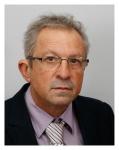 Joseph Sifakis has been appointed as Full Professor of Computing and Communications systems at the School of Computer and Communication Sciences (IC). Internationally renowned, Joseph Sifakis founded the Verimag laboratory, recognized worldwide for its contributions to software testing, as well as for its industrial collaborations (Airbus, Schneider Electric). The author of many publications, he has received many prizes and awards in France and elsewhere in Europe (CNRS silver medal, membership of the French Academy of Sciences and the Academy of Europe), as well as several doctorates honoris causa, including one from EPFL. In 2007, Joseph Sifakis received the Turing Prize, considered to be the computer science equivalent of the Nobel Prize or the Fields Medal.
Joseph Sifakis has been appointed as Full Professor of Computing and Communications systems at the School of Computer and Communication Sciences (IC). Internationally renowned, Joseph Sifakis founded the Verimag laboratory, recognized worldwide for its contributions to software testing, as well as for its industrial collaborations (Airbus, Schneider Electric). The author of many publications, he has received many prizes and awards in France and elsewhere in Europe (CNRS silver medal, membership of the French Academy of Sciences and the Academy of Europe), as well as several doctorates honoris causa, including one from EPFL. In 2007, Joseph Sifakis received the Turing Prize, considered to be the computer science equivalent of the Nobel Prize or the Fields Medal.
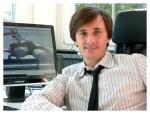 Grégoire Courtine has been appointed as Associate Professor of Life Sciences at the School of Life Sciences (SV). Grégoire Courtine is an expert in the development of new approaches to regenerating lesions in the spinal cord – this area of research is called neurorehabilitation. During his post-doctoral course at UCLA and in his own laboratory in Zurich, he performed work that made a major contribution to new perspectives in the treatment of spinal cord lesions. These are based on specific stimuli and the plasticity of the neuronal circuits in the medulla. His projects are in the neuroscience field, but are clearly intended for clinical application. These are encouraging results for future treatments, and this alliance between neuroscience and technology fits perfectly with the philosophy of EPFL’s Center for Neuroprosthetics.
Grégoire Courtine has been appointed as Associate Professor of Life Sciences at the School of Life Sciences (SV). Grégoire Courtine is an expert in the development of new approaches to regenerating lesions in the spinal cord – this area of research is called neurorehabilitation. During his post-doctoral course at UCLA and in his own laboratory in Zurich, he performed work that made a major contribution to new perspectives in the treatment of spinal cord lesions. These are based on specific stimuli and the plasticity of the neuronal circuits in the medulla. His projects are in the neuroscience field, but are clearly intended for clinical application. These are encouraging results for future treatments, and this alliance between neuroscience and technology fits perfectly with the philosophy of EPFL’s Center for Neuroprosthetics.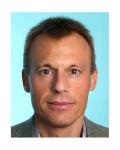 Michael Lehning has been appointed EPFL Full Professor of Cryospheric Science at the School of Architecture, Civil and Environmental Engineering ENAC (at 30%) and at the Swiss Federal Research Institute for Forest, Snow and Landscape Research, WSL (at 70%). Michael Lehning is internationally recognized for his innovative approaches to the study of the dynamics of snow-cover and the prevention of alpine risks. He pioneered the SNOWPACK and Alpine3D modeling tools. These analytical tools are indispensable today for preventing avalanches in high-risk environments, and he not only developed them but also helps to update them. Michael Lehning has also contributed to developing measurement networks in alpine regions, taking account of the physics and dynamics of snow and climatic variations, as well as the risks of avalanches.
Michael Lehning has been appointed EPFL Full Professor of Cryospheric Science at the School of Architecture, Civil and Environmental Engineering ENAC (at 30%) and at the Swiss Federal Research Institute for Forest, Snow and Landscape Research, WSL (at 70%). Michael Lehning is internationally recognized for his innovative approaches to the study of the dynamics of snow-cover and the prevention of alpine risks. He pioneered the SNOWPACK and Alpine3D modeling tools. These analytical tools are indispensable today for preventing avalanches in high-risk environments, and he not only developed them but also helps to update them. Michael Lehning has also contributed to developing measurement networks in alpine regions, taking account of the physics and dynamics of snow and climatic variations, as well as the risks of avalanches.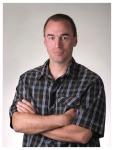 Anders Meibom has been appointed as Full Professor of Earth Sciences at the School of Architecture, Civil and Environmental Engineering (ENAC). He has pursued an atypical academic path, his physics qualifications enabling him to develop in close conjunction three advanced research fields in which he has become an international authority: geochemistry, cosmochemistry and biomineralization. This appointment is part of the joint approach between EPFL and the University of Lausanne for promoting life, planetary and environmental sciences. One of the research paths at ENAC relates to the analysis and modeling of environmental transfer processes and technologies for preventing and monitoring pollution. Recruiting a specialist in analytical geochemistry opens the way to future developments both at ENAC and in other EPFL schools, but also in Earth Sciences at the University of Lausanne.
Anders Meibom has been appointed as Full Professor of Earth Sciences at the School of Architecture, Civil and Environmental Engineering (ENAC). He has pursued an atypical academic path, his physics qualifications enabling him to develop in close conjunction three advanced research fields in which he has become an international authority: geochemistry, cosmochemistry and biomineralization. This appointment is part of the joint approach between EPFL and the University of Lausanne for promoting life, planetary and environmental sciences. One of the research paths at ENAC relates to the analysis and modeling of environmental transfer processes and technologies for preventing and monitoring pollution. Recruiting a specialist in analytical geochemistry opens the way to future developments both at ENAC and in other EPFL schools, but also in Earth Sciences at the University of Lausanne. Frank Nüesch, Head of Laboratory at the Swiss Federal Laboratories for Materials Science and Technology (EMPA) in Dübendorf, has been appointed as Honorary Professor at the School of Engineering (STI). A Swiss national, he obtained a physics diploma at ETH Zurich before continuing his studies at EPFL. In 1995, under Professor Michael Grätzel’s supervision, he successfully defended a scientific doctoral thesis on the subject of the photochemical properties of solar cells sensitized by colorant. As a result of his research work at EMPA in the field of organic optoelectronics and, in particular, bio-photovoltaics, Frank Nüesch will be able to continue to develop some aspects that are not directly studied at EPFL. This collaboration between EPFL and EMPA will certainly lead to interesting advances in this field.
Frank Nüesch, Head of Laboratory at the Swiss Federal Laboratories for Materials Science and Technology (EMPA) in Dübendorf, has been appointed as Honorary Professor at the School of Engineering (STI). A Swiss national, he obtained a physics diploma at ETH Zurich before continuing his studies at EPFL. In 1995, under Professor Michael Grätzel’s supervision, he successfully defended a scientific doctoral thesis on the subject of the photochemical properties of solar cells sensitized by colorant. As a result of his research work at EMPA in the field of organic optoelectronics and, in particular, bio-photovoltaics, Frank Nüesch will be able to continue to develop some aspects that are not directly studied at EPFL. This collaboration between EPFL and EMPA will certainly lead to interesting advances in this field.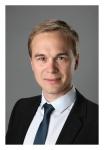 Kevin Sivula has been appointed Tenure Track Assistant Professor of Chemical Engineering at the School of Basic Sciences (SB). Originally from the United States, Kevin Sivula studied at the University of Minnesota (USA), where he obtained a Bachelor degree in chemical engineering. He continued his studies in this field at the University of California, Berkeley (USA), where he gained his doctorate in 2007. Later, he joined Professor Michael Grätzel’s group at EPFL, where he developed nanostructured films with an iron oxide base for hydrogen production using solar energy. Kevin Sivula advocates a resolutely modern approach to teaching chemical engineering, combining basic courses with more targeted courses in the material sciences that correspond to industry’s latest needs. The students are also encouraged to assess the economic and environmental impact of new techniques for producing materials.
Kevin Sivula has been appointed Tenure Track Assistant Professor of Chemical Engineering at the School of Basic Sciences (SB). Originally from the United States, Kevin Sivula studied at the University of Minnesota (USA), where he obtained a Bachelor degree in chemical engineering. He continued his studies in this field at the University of California, Berkeley (USA), where he gained his doctorate in 2007. Later, he joined Professor Michael Grätzel’s group at EPFL, where he developed nanostructured films with an iron oxide base for hydrogen production using solar energy. Kevin Sivula advocates a resolutely modern approach to teaching chemical engineering, combining basic courses with more targeted courses in the material sciences that correspond to industry’s latest needs. The students are also encouraged to assess the economic and environmental impact of new techniques for producing materials.
 Katerina Argyraki has been appointed Tenure Track Assistant Professor of Computing and Communication Systems at the School of Computer and Communication Sciences (IC). Her research field takes place at the interface of networks, systems and security. This unique combination is essential in the context of the future of the internet and its services, in particular “cloud computing”. After her doctorate, the researcher returned as a post-doctoral student to EPFL, where she is working with Professors Patrick Thiran and Willy Zwaenepoel. Katerina Argyraki received a “Best Paper Award” from the prestigious “ACM Symposium on Operating Systems Principles (SOSP)” conference.
Katerina Argyraki has been appointed Tenure Track Assistant Professor of Computing and Communication Systems at the School of Computer and Communication Sciences (IC). Her research field takes place at the interface of networks, systems and security. This unique combination is essential in the context of the future of the internet and its services, in particular “cloud computing”. After her doctorate, the researcher returned as a post-doctoral student to EPFL, where she is working with Professors Patrick Thiran and Willy Zwaenepoel. Katerina Argyraki received a “Best Paper Award” from the prestigious “ACM Symposium on Operating Systems Principles (SOSP)” conference.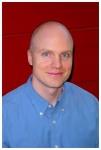 George Candea has been promoted to Associate Professor of Computing and Communication Systems at the School of Computer and Communication Sciences (IC). He adopted a pragmatic approach to software deficiencies, these problems being currently a major cause of breakdowns in software systems. He identified the many reasons for computer crashes in an approach that made it possible to design reliable and fast recovery programs. He worked out the concept of the micro-restart; that is, a “surgical” restart of the parts of the systems that have caused the breakdown. The importance of his work has been recognized in the industrial field, with Google recently having awarded him a “Google Focus Grant” to support his research.
George Candea has been promoted to Associate Professor of Computing and Communication Systems at the School of Computer and Communication Sciences (IC). He adopted a pragmatic approach to software deficiencies, these problems being currently a major cause of breakdowns in software systems. He identified the many reasons for computer crashes in an approach that made it possible to design reliable and fast recovery programs. He worked out the concept of the micro-restart; that is, a “surgical” restart of the parts of the systems that have caused the breakdown. The importance of his work has been recognized in the industrial field, with Google recently having awarded him a “Google Focus Grant” to support his research. Professor Joerg Huelsken has been awarded the title of Associate Professor of life sciences at the School of Life Sciences (SV). His work concerns the similarity between malfunctionings during tumor formation and the normal molecular mechanisms of embryo development. He was able to demonstrate the implication in metastases of a well-known signaling pathway in tissue formation in the embryo. This process is triggered in a particular tumorous cell, called a cancerogenic stem cell, in a similar way to the stem cells responsible for regenerating tissues in the healthy organism. This work will provide some new strategies for combating the formation of metastases in the developmental process of cancer.
Professor Joerg Huelsken has been awarded the title of Associate Professor of life sciences at the School of Life Sciences (SV). His work concerns the similarity between malfunctionings during tumor formation and the normal molecular mechanisms of embryo development. He was able to demonstrate the implication in metastases of a well-known signaling pathway in tissue formation in the embryo. This process is triggered in a particular tumorous cell, called a cancerogenic stem cell, in a similar way to the stem cells responsible for regenerating tissues in the healthy organism. This work will provide some new strategies for combating the formation of metastases in the developmental process of cancer. 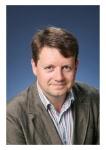 Patrick Thiran has been appointed as Full Professor of Computing and Communication Systems at the School of Computer and Communication Sciences (IC). He is an international expert in the field of wireless networks. These are undergoing a popularity boom that is exerting considerable pressure on systems operators, and it’s essential to know more about the development and performance of these networks. In this field, Patrick Thiran has introduced three key innovations: understanding the asymptotic behavior of connectivity, determining the capacity of these networks, and the importance of equity in multi-access networks such as Wi-Fi. The quality of Patrick Thiran’s teaching was also acknowledged when he was granted the “Crédit Suisse Teaching Award (EPFL)” in 2008.
Patrick Thiran has been appointed as Full Professor of Computing and Communication Systems at the School of Computer and Communication Sciences (IC). He is an international expert in the field of wireless networks. These are undergoing a popularity boom that is exerting considerable pressure on systems operators, and it’s essential to know more about the development and performance of these networks. In this field, Patrick Thiran has introduced three key innovations: understanding the asymptotic behavior of connectivity, determining the capacity of these networks, and the importance of equity in multi-access networks such as Wi-Fi. The quality of Patrick Thiran’s teaching was also acknowledged when he was granted the “Crédit Suisse Teaching Award (EPFL)” in 2008.